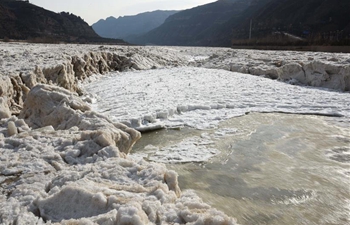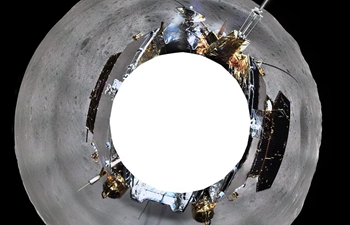BAGHDAD, Jan. 17 (Xinhua) -- A 30-minute drive from the center of Baghdad will take visitors to the ancient Mesopotamian site of Dur Kurigalzu, a forgotten gem nestled in the western countryside of the city.
Once a favorable destination for picnics by Baghdadi families at weekends, the site has been neglected by consecutive governments and rarely visited by locals for the past 16 years.
Speaking of the current state, Jinan Fadhil, deputy director of the site, said that travelling groups from Germany and Sweden used to visit until late 1990s, but there is no tourist from such countries since the war in 2003.
As invading troops unleashed chaos throughout Iraq, archaeological sites, museums and even hospitals were ransacked by looters.
The site of Dur Kurigalzu was not spared during the pillaging campaign subsequent to the fall of Baghdad. Its modern restaurant, visitors center and museum were looted and vandalized.
In a temple court at the site, an old man kneeled down to flick the dust off a tile, revealed ancient cuneiform, and read "Built by king Kurigalzu, in dedication to the God Enlil."
Sadly, garbage and empty bottles of beer are scattered in temple courts, while tedious graffiti blatantly drawn on walls show years of negligence and reflect the lawless state in Iraq.
"A series of upheavals have damaged the society and decreased the cultural level in the country. Young delinquent visitors break and vandalize in cold blood, unaware of the significance of the site's history," Fadhil added.
The grand ziggurat, which dominates the ancient site along with an adjacent temple complex, was cleverly-built with sun-dried bricks, reed mats and bundles to bolster the structure.
Due to centuries of damaging environmental changes and a continuous absence of restoration plans, the ziggurat has eroded and is at risk of collapsing. In general, the site is in a dilapidated state and in need of rehabilitation.
Parochial politicians who control the spigot of funds have turned a blind eye to the sufferings of Iraqis for some 16 years, and are very likely to continue overlooking the state of ancient ruins in the country.
"We have repetitively sent pleas to the Ministry of Tourism and Antiquities, requesting help to rehabilitate and protect the site, to no avail. Their response has always been the same -- insufficient funds," Fadhil said.
Three years ago, Baghdad resident and archaeology enthusiast Ali al-Makhzomy started a culture project named "Bilweekend," aimed at reminding Iraqis of their rich history and reviving tourism in the country by organizing trips to ancient sites.
"In general, archaeological sites in Iraq are neglected. Take Dur Kurigalzu for instance, there is no visitor center, no restaurants or restrooms, as the authorities failed to provide the necessary facilities in ancient sites," Makhzomy said.
In bygone times, travelling by camel caravans would cognize the approach to Baghdad on the sight of the imposing ziggurat of Dur Kurigalzu, built in dedication to ancient Mesopotamian God Enlil.
Once the capital of Babylonia, the city was founded sometime around the 14th century B.C. by the Kassite King Kurigalzu I. Its 171 feet-high ziggurat is one of 10 oldest structures in Iraq.
"I have travelled and seen ancient sites in other countries. It saddens me how in Iraq people are indifferent regarding the oldest civilization in the world vis-a-vis other countries, where governments utilize archaeological sites for the benefit of their people, and people are proud of the history of their countries," Makhzomy added.

















